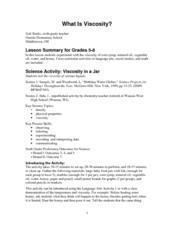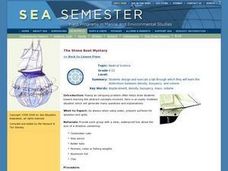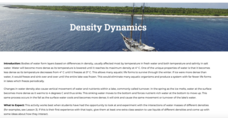Teach Engineering
Determining Densities
Don't be dense—use a robust resource. The second installment of a five-part Floaters and Sinkers unit has learners determine the densities of several objects. As part of the activity, they learn the displacement method for finding...
Teach Engineering
Floaters and Sinkers
Whatever floats your boat. Young engineers learn about density by measuring the masses and volumes of boxes filled with different materials. Using their knowledge of densities, they hypothesize whether objects with given densities will...
NEED Project
Calibrating Thermometers
Engage young scientists in the upper-elementary and middle school grades with this collection of simple experiments. Whether you're teaching about heat transfer, density, or potential energy this resource has a lab for you.
American Chemical Society
Investigating the Line
Note that this activity is best paired with the preceding activity in the unit. In that activity, elementary physical scientists observed that the color coating of M&Ms® candies do not mix when dissolved off of the chocolate surface....
Exploratorium
The Dipping Bird
If you have or want to order the dipping bird demonstration, it is useful for showing how evaporation and changes in the pressure of a closed system cause cyclical motion. After teaching about pressure, consider setting this little guy...
Exploratorium
Bubble Suspension
Create a cushion of carbon dioxide gas to float some soap bubbles on. Many concepts can be demonstrated through this activity:
Carbon dioxide gas is more dense than air
Bubbles are semipermeable, allowing only carbon dioxide to diffuse...
Curated OER
Taking the Boat to Manaus
Fifth graders apply the concepts they know regarding mass, volume and density in the previous activities to design a boat. Student teams must make a boat which can travel the waters of the Amazon Rainforest. Each group makes a...
Curated OER
Atomic Theory
An extremely thorough presentation walks new chemists through the basics of matter. There really isn't a unifying theme, however So many topics are covered: forces, elements, atomic structure, chemical properties, compounds, quarks,...
Curated OER
Density
This sequence of slides is a fabulous introduction to the concept of density as it relates to mass, volume, physical impact, and interpretation. Various examples are given and your class will find the charts and procedures helpful in...
Curated OER
What Is Viscosity?
Students experiment with the visocosity of corn syrup, mineral oil, vegetable oil, water, and honey. They research viscosity before beginning. Pupils draw the conclusion that the marble sinks more slowly in the liquids with greater...
Curated OER
Chapter 12 Review, Mixed Review: Solutions
Although there are only six questions on this chemistry handout, it makes a thorough review of solutions. Novices explain why a compound is not an electrolyte, identify types of compounds, and calculate moles, grams, and molalilties in...
Curated OER
BioFuels: The Chemistry and Economics of Alternative Fuels
Junior chemists manufacture biodiesel in the lab. For this exercise, they check the purity of the biodiesel using thin layer chromatography. They also calculate its density and heat of combustion. They are sure to rise to the...
Curated OER
Lake Strata and Internal Waves
Use the classic density demonstration of placing a cola, a clear soda, and a diet soda into a tank of water. Then let learners attempt to pour some of the soda into layers in a clear container. The procedure explains a thermocline, and...
Curated OER
Exploring Density with Salt and Fresh Water: Part 5
This particular lesson was written by the National Earth Science Teachers Association, but density is a concept that you can teach at the beginning of the school year in your life, physical, or earth science classes. It would be fun to...
Curated OER
WS 1.7 Density
In this density worksheet, students calculate the density of objects given their mass and volume. They are given a table with the density of a variety of substances and given the mass or volume and must find the unknown.
Curated OER
The Stone Boat Mystery
Students design and execute a lab through which they study the distinctions between density, buoyancy, and volume.
Curated OER
Density Dynamics
Students set up working models demonstrating lake turnover and the formation of deep water masses in the oceans.
Curated OER
Count Marsili & the Mediterranean Current
Students integrate history and science while discovering how salinity affects the density of water. After a lecture/demo, students work in groups to complete a lab activity that demonstrates how salinity affects the density of water.
Curated OER
As a Matter of Fact
Elementary-aged scientists discover that all matter has mass. They are shown the difference between mass and weight, and learn how to calculate mass using the appropriate tools and methods. The scientific method is used while estimating...
Alabama Learning Exchange
Float or Sink?
Experiment with mass and density as scholars figure out what makes things float or sink. First, they watch a podcast introducing these concepts. Be sure to use the comprehension question to test their understanding. Young scientists...
Curated OER
Solids, Liquids, and Gases
Not many lessons on states of matter can hold a candle to this one! Junior chemists gauge the density of paraffin in both liquid and solid phases. They fill 60 mL syringes with different materials to experiment with compressibility and...
Curated OER
Conversion Factors
In this conversion factor worksheet, high schoolers convert 15 problems within the SI system of measurement. They show their work and indicate the proper units.
Curated OER
Density Problems
In this density worksheet, students are given 11 problems and they determine the density of the substance, the mass of the substance or the volume. They write the equation they use to solve the problem, they show their work and they box...
Curated OER
Displacement and Density
High schoolers explore displacement. In this displacement and density lesson, pupils find the volume of irregular shaped objects. Afterward, they determine the volume of containers. They compute the amount of water displacement.

























